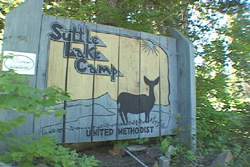
|
||||||||
| United Methodist HIV/AIDS Camp Offers Hope | |||||||
|
Doug Finnell used to lie in bed waiting to die. He has been HIV-positive for 16 years, but two years ago, he attended his first United Methodist camp for HIV/AIDS patients. Spending about a week at Suttle Lake Camp and Retreat Center near Sisters, Ore., changed everything. "I'm around people I can open up to, and they have helped me to truly find my voice," says Finnell, of Portland, Ore. Finnell is a participant in "Strength for the Journey," a camping ministry founded by the late Rev. Bert All, a United Methodist pastor who suffered from AIDS. All understood the alienation from church and society that AIDS patients often suffer. The retreat allows these patients to gather in a community of understanding and acceptance. Since its inception, several United Methodist regional conferences across the nation have embraced the concept and now host annual Strength for the Journey camps. Julie Smith of Gibbon, Ore., has been attending Suttle Lake Camp for 11 years. She says the camp empowers participants through individual spirituality. "That doesn't mean that it has to be based on religion, but it can be based on the spirituality of people coming together, on common ground," she says. "They can be themselves, they can relax and they can take this home with them. Even when they get back to the workplace, they can think back and say, ‘You know, if I'm having a bad day, remember camp.'" As one of the deans of the Oregon camp, nurse Greg Sabin says the goal of leadership is to foster a welcoming atmosphere. He agrees that spirituality plays a major role during the week, "but proselytizing a certain path is not what we're about. What we're really about is loving people and feeling God's presence and going on from there." When Rick Casias of Portland found out he was HIV-positive, he said he tried to drink his problems away. Last year's camp inspired him to seek treatment for alcoholism. "I want to try and come to camp every year of my life that I'm alive because I feel that Strength for the Journey is giving me my life back," he says. "It shows me a way of living; it's not that you have to give up because of the disease. I meet all of these beautiful people who give me inspiration and give me strength to go on living." Traditional camp activities are combined with workshops on health and healing and small-group discussions. An evening campfire and talent show are favorites of campers. First-timers are often taken aback by the atmosphere at camp, Smith says. "At first, people want a lot of quiet time, but there may be those who don't have a support group, and they want to talk a great deal." Either way, campers often make plans to stay in touch throughout the year. "Maybe they needed this to figure out what they wanted to do in life," Smith says. "You have to make choices, and you have to make a decision – OK, where do I go from here? That is part of the journey." Like many camp sponsors, the church's Oregon-Idaho Annual (regional) Conference faces the uncertainty of funding. Sabin attributes money woes to people's perception of HIV/AIDS. "There's been so much exposure, people tend to get blasé about AIDS, but people are still dying and people are still getting sick." Campers attest to the outreach and its effects. Finnell no longer lies in bed counting the hours between pills. He is adamant that Strength for the Journey has changed his life, "What a supportive church! I haven't even scratched the surface of the whole organization," he says. "When you are HIV-positive, you're surrounded by things that remind you of death and people spreading fear, and this is a completely healing place." Longtime camper Jim Powell of Medford, Ore., agrees. He's seen the disease take the lives of several friends. But, he says, Strength for the Journey eliminates the feeling of hopelessness, "It's like I wish that after I leave tomorrow we could come back next month and do it all over again." |
|
||||||
 |
Last
Updated
October 8, 2005




